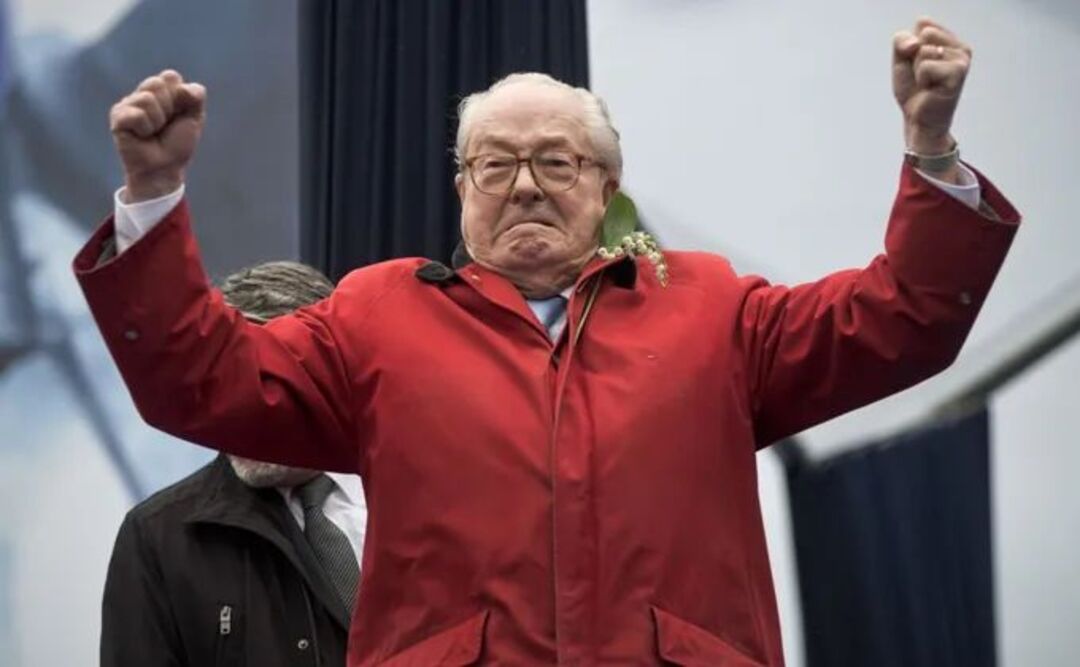-
Jean-Marie Le Pen: The End of the "Legend" of the Far Right in France

Jean-Marie Le Pen has long described himself as "the legend," and although opinions differ on this characterization, his legacy as one of the prominent figures of the French far right has not been erased from history. Le Pen, who reached the finals of the presidential election in 2002, passed away at the age of 96 in the Paris region.
His family announced in a statement circulated in the media that Jean-Marie Le Pen died on Tuesday afternoon, surrounded by his loved ones. He often said, "Yes, I will leave a mark in history because I am a legend at heart," emphasizing the success of his political life.
Jean-Marie Le Pen was born on June 20, 1928, in the French municipality of La Trinité, and he was educated at a boarding school in Vannes. In the 1940s, he enrolled in the Faculty of Law at the University of Paris, before embarking on a military career by joining the French Foreign Legion in 1954, serving in several countries including Algeria and Indochina.
After returning to France, Le Pen became a follower of the writer and politician Pierre Poujade, who led a protest movement against taxes during that period. In 1956, he was elected as the youngest member of the National Assembly, and he was reelected in 1958, but was defeated in 1962, prompting him to establish an association that recorded Nazi speeches and military songs.
The year 1972 was pivotal in his career, as he founded the National Front party (now the National Rally), which he viewed as a vessel for far-right ideology. From its inception, the party focused on what it considered the threat of immigration, particularly from France's former colonies in North Africa.
Le Pen did not believe in the equality of races and fought to promote a culture of xenophobia. He stated in a televised interview in 1996: "I believe in the inequality of races, and history clearly shows that. They do not have the same ability or level of development."
He opposed European integration and called for the reinstatement of the death penalty, as well as a ban on the construction of new mosques in France. He was involved in several political controversies due to his provocative positions, having been sentenced in the 1960s to suspended prison time for "apologizing for war crimes," and was convicted in the 1980s for violating laws prohibiting Holocaust denial.
Despite this, Le Pen garnered significant support from the working class, which was affected by rising crime and unemployment rates during the 1980s and 1990s, although this support did not translate into substantial electoral votes. Le Pen ran for the presidency several times but secured only 1% of the vote in 1974 and 15% in 1988 and 1995.
Le Pen achieved a notable accomplishment in 2002 when he defeated Prime Minister Lionel Jospin in the first round of the election, but he lost easily in the second round. In 2007, he received over 10% of the votes in the first round, which was not enough to qualify him for the runoff.
In 2010, Le Pen announced that he would step down from leadership of the National Rally, and his daughter, Marine Le Pen, who is 56 years old, was appointed as his successor in January 2011. Marine Le Pen faced current French President Emmanuel Macron in the 2017 and 2022 presidential elections but was also unable to achieve victory.
Tags
You May Also Like
Popular Posts
Caricature
BENEFIT Sponsors BuildHer...
- April 23, 2025
BENEFIT, the Kingdom’s innovator and leading company in Fintech and electronic financial transactions service, has sponsored the BuildHer CityHack 2025 Hackathon, a two-day event spearheaded by the College of Engineering and Technology at the Royal University for Women (RUW).
Aimed at secondary school students, the event brought together a distinguished group of academic professionals and technology experts to mentor and inspire young participants.
More than 100 high school students from across the Kingdom of Bahrain took part in the hackathon, which featured an intensive programme of training workshops and hands-on sessions. These activities were tailored to enhance participants’ critical thinking, collaborative problem-solving, and team-building capabilities, while also encouraging the development of practical and sustainable solutions to contemporary challenges using modern technological tools.
BENEFIT’s Chief Executive Mr. Abdulwahed AlJanahi, commented: “Our support for this educational hackathon reflects our long-term strategic vision to nurture the talents of emerging national youth and empower the next generation of accomplished female leaders in technology. By fostering creativity and innovation, we aim to contribute meaningfully to Bahrain’s comprehensive development goals and align with the aspirations outlined in the Kingdom’s Vision 2030—an ambition in which BENEFIT plays a central role.”
Professor Riyadh Yousif Hamzah, President of the Royal University for Women, commented: “This initiative reflects our commitment to advancing women in STEM fields. We're cultivating a generation of creative, solution-driven female leaders who will drive national development. Our partnership with BENEFIT exemplifies the powerful synergy between academia and private sector in supporting educational innovation.”
Hanan Abdulla Hasan, Senior Manager, PR & Communication at BENEFIT, said: “We are honoured to collaborate with RUW in supporting this remarkable technology-focused event. It highlights our commitment to social responsibility, and our ongoing efforts to enhance the digital and innovation capabilities of young Bahraini women and foster their ability to harness technological tools in the service of a smarter, more sustainable future.”
For his part, Dr. Humam ElAgha, Acting Dean of the College of Engineering and Technology at the University, said: “BuildHer CityHack 2025 embodies our hands-on approach to education. By tackling real-world problems through creative thinking and sustainable solutions, we're preparing women to thrive in the knowledge economy – a cornerstone of the University's vision.”
opinion
Report
ads
Newsletter
Subscribe to our mailing list to get the new updates!






















